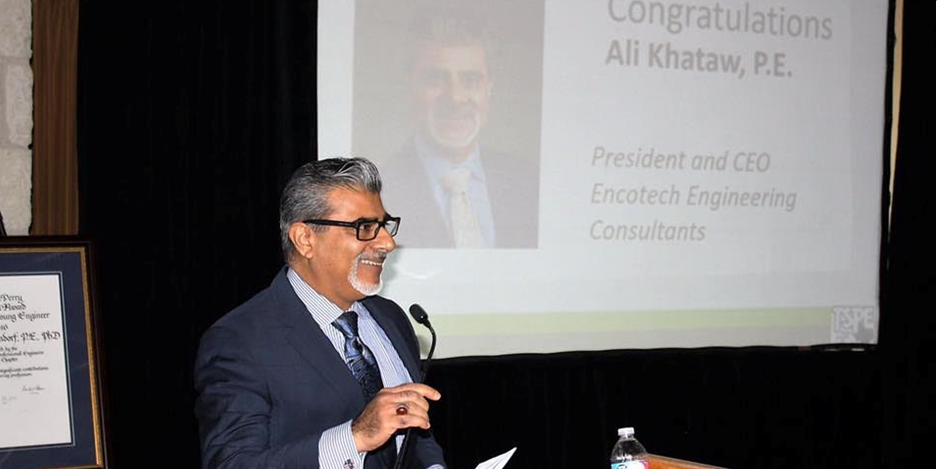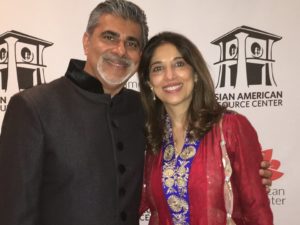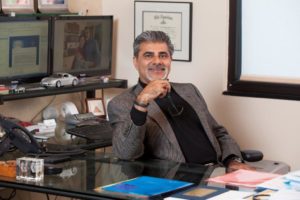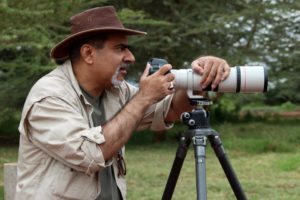
By: Elizabeth McGuire
It’s true Ali Khataw’s personal story is about an immigrant finding the American dream in Austin, but it’s also about a devoted man finding every opportunity to give back to his adopted hometown.
Mr. Khataw is President/CEO of Encotech Engineering and this year’s Leadership Austin’s board chair.
Born in Pakistan and raised in Bangladesh, Pakistan, Hong Kong and England, Khataw first came to Austin in 1980 to study civil engineering at the University of Texas at Austin. More than three decades later, after starting his own firm and establishing himself in the community, he was named the 2016 Engineer of the Year by the local chapter of the Texas Society of Professional Engineers.
 Khataw is a tireless community volunteer who is currently serving on nine boards, often with organizations that focus on economic development. He is a current board member of KUT, Austin Young Chamber of Commerce, Center for Asian American Studies, and several other organizations. Khataw is also a member of Austin Area Research Organization and Chair Emeritus for Great Austin Asian Chamber of Commerce.
Khataw is a tireless community volunteer who is currently serving on nine boards, often with organizations that focus on economic development. He is a current board member of KUT, Austin Young Chamber of Commerce, Center for Asian American Studies, and several other organizations. Khataw is also a member of Austin Area Research Organization and Chair Emeritus for Great Austin Asian Chamber of Commerce.
The University of Texas awarded Ali Khataw with the Community Leadership Circle Award through its Diversity and Community Engagement Department.
When Khataw is not working or volunteering, he is traveling the world with his family and his camera. His photo philanthropy projects all benefit nonprofit charities.
That’s right—even his hobbies work overtime to serve the community.
 As quoted from his Photo Philanthropy website, “My desire to help others and use art to make a difference has inspired me to delve into the world of Photo Philanthropy. Images have an undeniable power and I want to harness that power and use it to better the conditions of living for those in the world who are not lucky enough to enjoy the luxuries many of us have been blessed with”.
As quoted from his Photo Philanthropy website, “My desire to help others and use art to make a difference has inspired me to delve into the world of Photo Philanthropy. Images have an undeniable power and I want to harness that power and use it to better the conditions of living for those in the world who are not lucky enough to enjoy the luxuries many of us have been blessed with”.
What do you enjoy about working in Austin?
Austin has been a great town for entrepreneurship because I got to ride with the growth of the city. When the markets fell down, it was a disaster for many but it didn’t affect Austin quite as much. A few years before the tech bust, our firm had strategically expanded into the public sector. So our firm has been well balanced between public and private work.
What motivates you?
In business: To be the best. Specifically, to be the best engineering firm out there. To give our clients what they require, which means quality of service and engineering that is technically correct.
In community: To build community engagement. There are a lot of things in our community we take for granted. We sometimes feel like the country owes us (health care, education and transportation, social equity to a certain extent) but we don’t want to give back. I think to be a concerned citizen, you need to have some passion of giving and a sense of responsibility in giving back to the community. There’s so much leadership needed every day on every issue.
As a graduate of the 2009 Essential class, what drew you to Leadership Austin?
One of the engineers in the community encouraged me to apply. I said, “Well, I’m scared that I won’t get in.” But I knew that I wanted to learn more about community issues and build new relationships with other business professionals, non-profit leaders and civic leaders that all care about one thing — stretching to make our community one of the best places to live.
 What lessons from Leadership Austin have stuck with you?
What lessons from Leadership Austin have stuck with you?
The program changed me quite a bit. I ran my business pretty much on the basis of “My way or the highway.” Because when you are small and entrepreneurial, you have the vision. You know where you want to go. You need to be the driver and the others are doers. As you grow to the size we are now, that’s when Leadership Austin really came into use. The core values of inclusiveness and collaborative decision making are a no brainer—it’s a formula for any organization. When people feel engaged, their productivity goes up. You aid them. It has really worked well for us.
What made you want to take a larger role in Leadership Austin?
What can be more satisfying than working with a group where everyone is a leader? And not just that—they also want to push you as a leader. The mission we have is to ignite passion for civic engagement and community leadership. Who doesn’t want to be around that type of energy and learning from others who you agree with and, more importantly, those who may have a different point of view?
What are you looking forward to this year as board chair?
First of all, it’s going to be so hard to fill the shoes. We’ve had some great leaders like Debbie Johnson and Geronimo Rodriguez among many others and so it’s going to be tough.
I will be focusing on three areas this year:
- Alumni engagement: We now have over 2,400 alumni who shared a common program experience. I would venture to guess that almost every decision in this community for the last 36 years had a Leadership Austin alumnus in the room. I want to be sure we are engaging alumni at every turn and harness that shared experience to continue to make an impact in our community.
- Community dialogue: Some days I think we are losing our ability to listen to someone else’s experiences. We will be exploring ways to support existing organizations that work hard to increase community dialogue and find new ways to share some of our programs with others. With all our growth, I will challenge us to find creative ways to expand our networks and increase relationships with each other by just sharing our experiences.
- Community trusteeship: I want us to focus more this year on the Leadership Austin core value of community trusteeship. This is where we are all called to be stewards of community and take a personal responsibility to work toward the common good of Greater Austin. Future generations deserve our commitment to act on the issues of the day and fulfill the future promise our region.
I feel honored to work with Christopher Kennedy. He is very effective as a CEO. He makes our board more of a governance board than a working board. We don’t have to worry about day-to-day events. Working side-by-side with him is going to be incredible.
How would you describe your leadership style?
I don’t consider myself as someone who knows everything. I like to have the right people assist in solving issues. I’m all for a more inclusive, collaborative leadership rather than a dictatorial one. If it comes to an engineering calculation or something like that, I might argue with someone in my office, but when you’re in a community setting there are many ways to solve a problem.
 Do you have any advice to Austin leaders?
Do you have any advice to Austin leaders?
Stay current and keep engaged. This goes for both emerging and established leaders. I’ve lived in this city for 34 years. This is a city that wants people to be engaged. The bottom line is if you’re not engaged, your voice won’t be heard.
What drives you to be so involved with community service?
I see myself as a connector. A lot of people come to me and ask if I can help them. When I’m able to make a difference, the satisfaction I get from that is a great feeling. Don’t get me wrong, I like the satisfaction I get when my firm lands a new contract, but the community connection with each other is incredible and keeps me in this great community.
